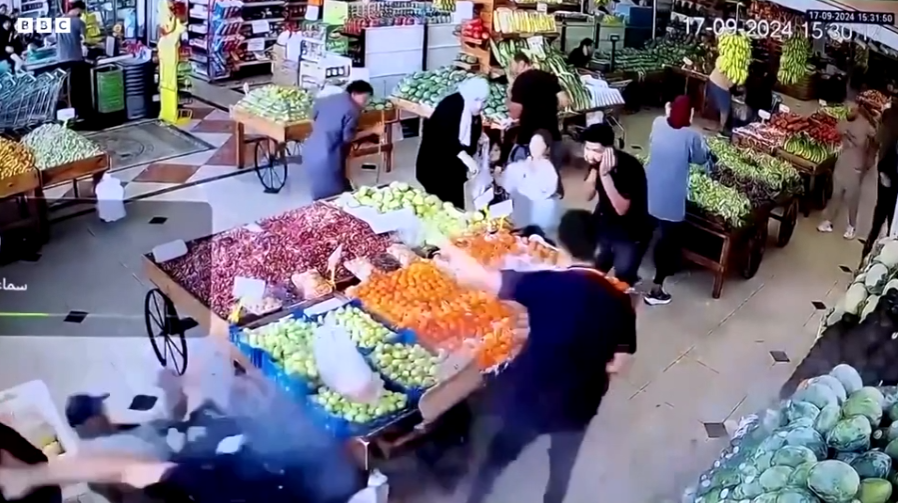(BBC News) Thousands of people have been injured in Lebanon, after pagers used by the armed group Hezbollah to communicate exploded almost simultaneously across the country on Tuesday.
At least 12 people were killed — including two children — Lebanese officials said. Some 2,800 were injured, many of them seriously.
It is unclear how the attack — which looks to have been highly sophisticated — occurred, though Hezbollah has blamed its adversary Israel. Israeli officials have so far declined to comment.
Here is what we know so far …
Analysts have been quick to express shock at the scale of Tuesday’s attack — saying Hezbollah prides itself on its security measures.
Some suggested a hack may have caused the pager batteries to overheat, causing the devices to explode. Such an act would be unprecedented.
But many experts say that is unlikely, with footage of the explosions inconsistent with the batteries overheating.
Some analysts say instead that some sort of supply chain attack, which involved the pagers being tampered with during their manufacture or in transit, was more likely.
Supply chain attacks are a growing concern in the cyber-security world with many high-profile incidents recently caused by hackers gaining access to products while they are in development.
But these attacks are normally contained to software. Hardware supply chain attacks are far more rare as they involve getting hands on to the device.
If this was indeed a supply chain attack, it would have involved a huge operation to secretly tamper with the pagers in some way.
Security officials in Lebanon say that the pagers were packed with a small amount of explosives months before the devices entered the country.
Speaking to the BBC, one ex-British Army munitions expert, who asked not to be named, speculated that the devices could have then been triggered by a remote signal.
A source close to Hezbollah told AFP that two of those killed were the sons of two Hezbollah MPs. They also said the daughter of a Hezbollah member was killed.
Among the injured was Iran’s ambassador to Lebanon, Mojtaba Amani. Reports in Iranian media said his injuries were minor.
Hezbollah chief Hassan Nasrallah was not hurt in the explosions, Reuters reported, quoting a source.
Lebanese Public Health Minister Firass Abiad said damage to the hands and face made up the majority of injuries.
Speaking to the BBC’s Newshour program, he said: “Most of the injuries appear to be to the face and especially to the eyes and also the hand with some amputations, whether it’s in the hands or the fingers, and some of them have injuries to their flank.”
He added: “The vast majority of the people who are presenting to the emergency rooms are in civilian clothes, so it’s very difficult to discern whether they belong to a certain entity like Hezbollah or others…
“But we are seeing among them people who are old or people who are very young, like the child who unfortunately died… and there are some of them who are healthcare workers,” the minister said.
Outside of Lebanon, 14 people were injured in similar blasts in neighbouring Syria, according to UK-based campaign group the Syrian Observatory for Human Rights.
So far, nobody has claimed responsibility — though Lebanon’s prime minister and Hezbollah have blamed Israel.
Prime Minister Najib Mikati said the explosions represented a “serious violation of Lebanese sovereignty and a crime by all standards.” A security source in the country accused the Israeli intelligence agency Mossad of being behind the attack, Reuters reported.
In its statement accusing Israel of being behind the attacks, Hezbollah said it held the country “fully responsible for this criminal aggression that also targeted civilians.”
“This treacherous and criminal enemy will certainly receive its just punishment for this sinful aggression, whether it expects it or not,” it added.
Unnamed US and Israeli officials told Axios that the explosions were initially planned as the opening move in an “all-out” offensive against Hezbollah. But in recent days Israel became concerned Hezbollah had become aware of the plan — so they were detonated early.
Israeli officials have not commented publicly on the allegations, but most analysts agree that it seems likely it is behind the attack.
Prof Simon Mabon, chair in International Relations at Lancaster University, told the BBC: “We know that Israel has a precedent of using technology to track its target,” but he called the scale of this attack “unprecedented”.
Lina Khatib, from the UK-based Chatham House, said the attack suggested that Israel has “deeply” infiltrated Hezbollah’s “communications network”.


